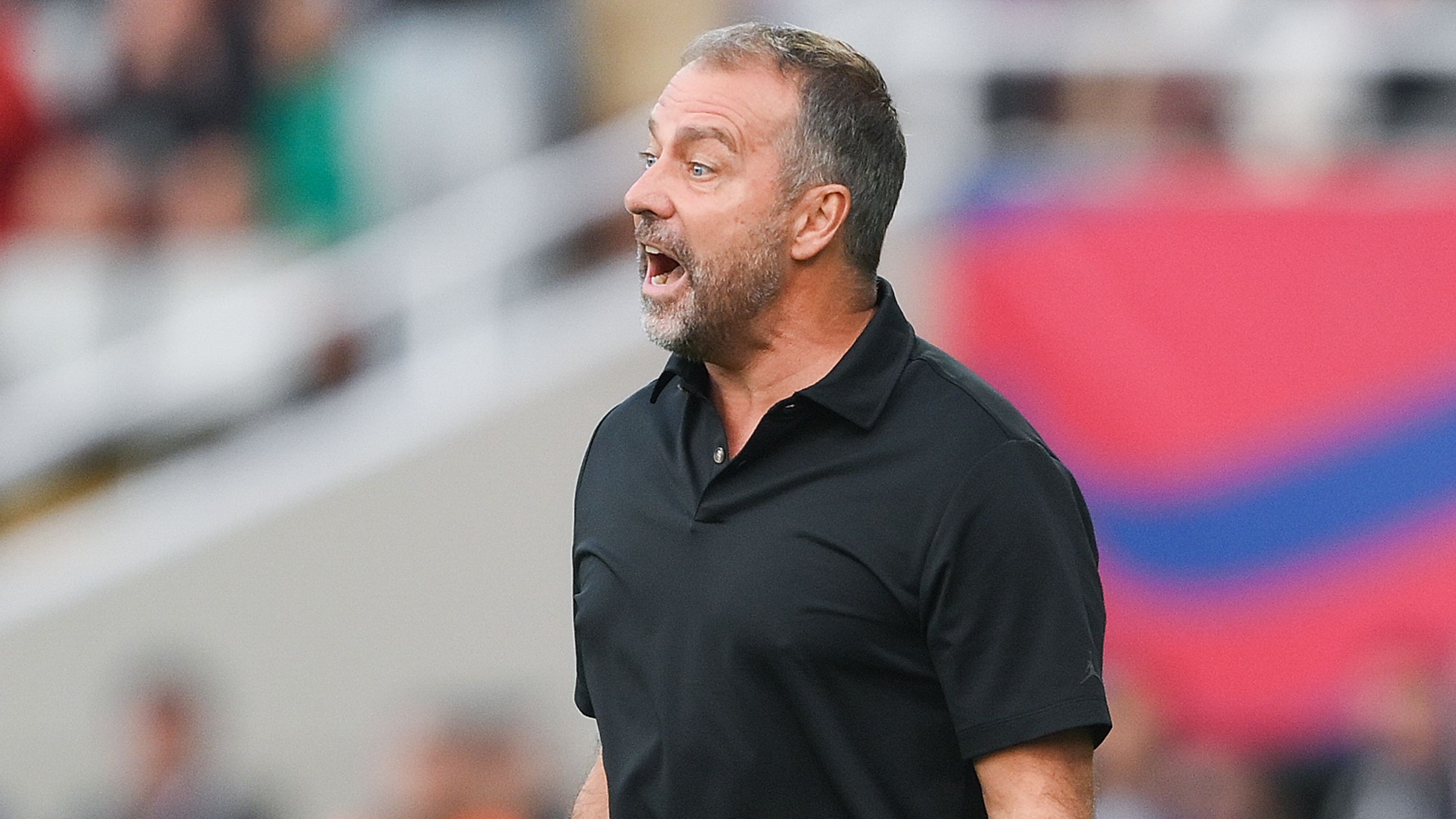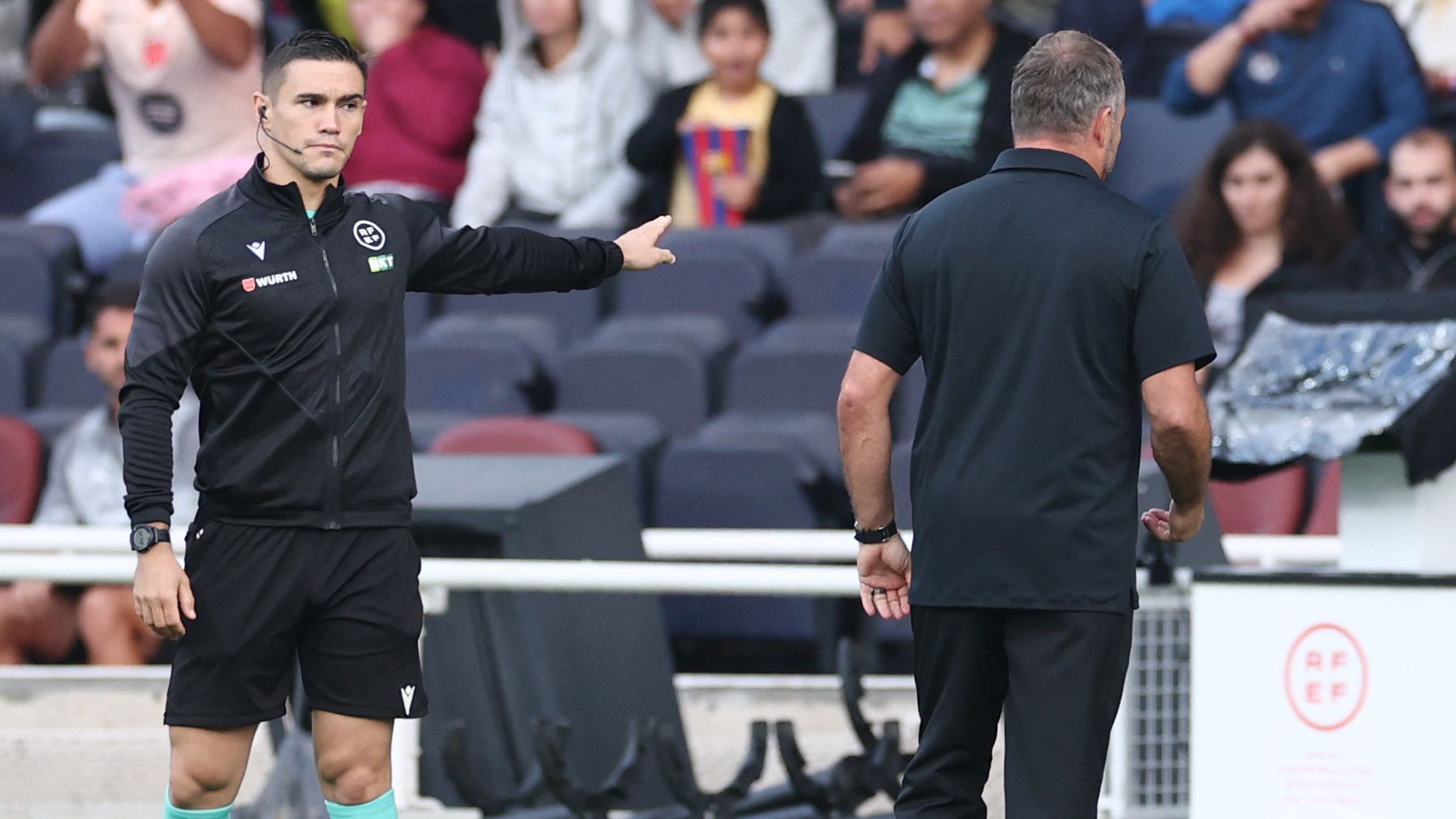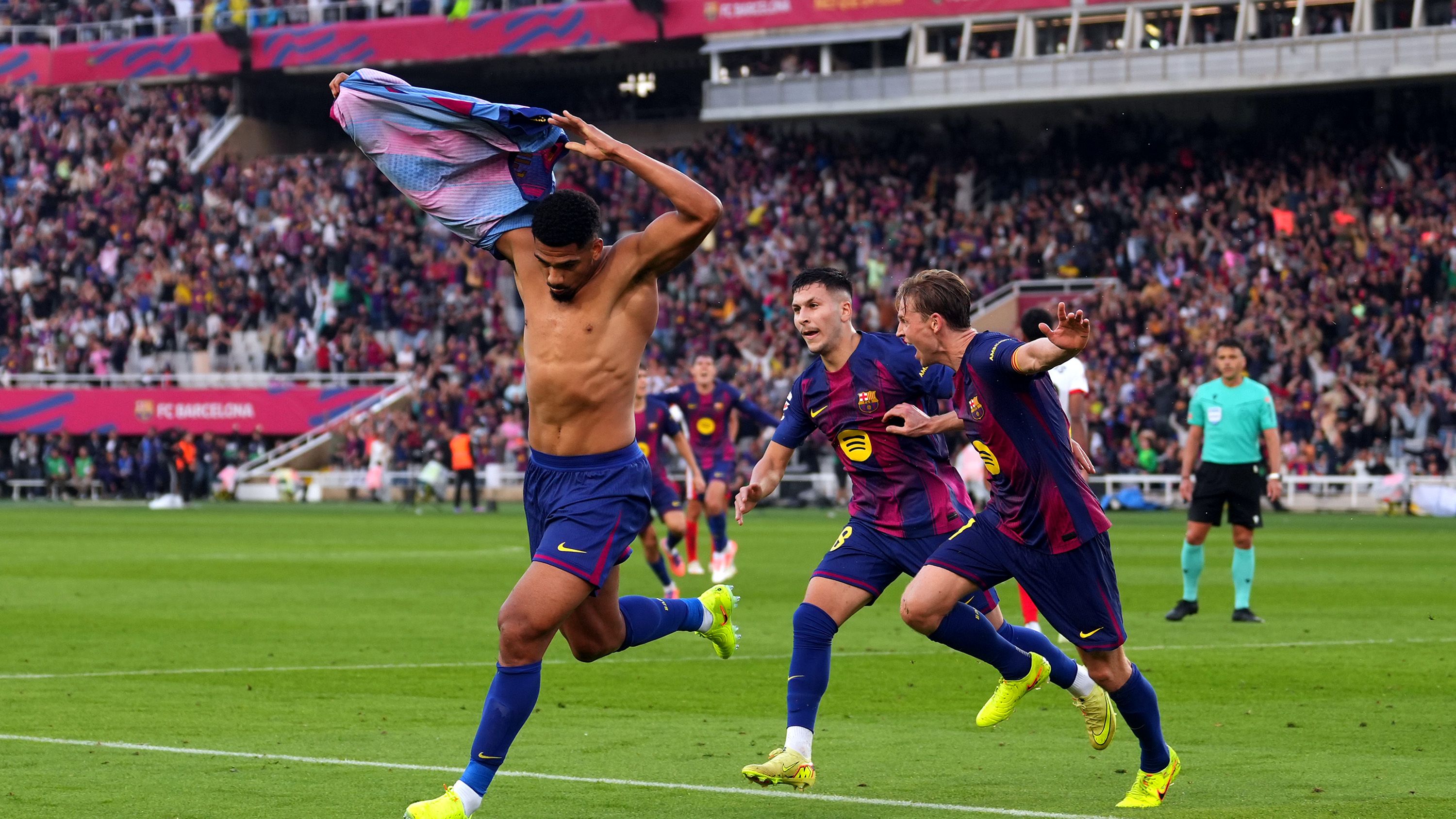


Unraveling Hansi Flick’s Emotional Outburst in Barcelona’s Thrilling Win Over Girona
In the heat of Barcelona’s intense La Liga clash with Girona, where the score was leveled at 1-1 in the final moments, Hansi Flick‘s frustration boiled over when officials signaled only four additional minutes at the Olympic Stadium. As his team pushed desperately for a vital goal to overtake rivals Real Madrid at the top, the experienced 60-year-old coach clashed with the referees over the extra time, leading to his ejection and absence from the upcoming El Clasico at Santiago Bernabeu.
Hansi Flick’s Explanation of His Fiery Gesture During the Match
After receiving his red card, Flick was spotted making a distinctive motion by the sidelines once Araujo sealed a dramatic late victory for Barcelona. The gesture involved striking his left hand against his right arm twice, leaving uncertainty about whether it targeted the referee or the assistant. Araujo connected with a precise cross from Frenkie de Jong, igniting jubilant reactions from the home crowd.
Insights into Flick’s Post-Match Comments on the Incident
Flick later shared his thoughts on the confrontation with officials and clarified his actions in a media session. He noted, “The game thrives on passion and pressure. That moment was purely celebratory. Frenkie got a booking nearby, but my response wasn’t aimed at the official. I’m unsure why I received another caution. It was all about our triumph; I was elated and intend no harm. I respect the referee’s call-it wasn’t personal. I clapped to motivate my squad.”
Flick’s Attempt to Engage with the Referee
Flick admitted trying to converse with referee Gil Manzano, who showed no interest. He explained, “I sought a dialogue, but he chose to move on, and I couldn’t follow. I honor his rulings as his role. My actions were unrelated to him personally. If he opts not to converse, I understand and move forward without disappointment.”
The Impact of Lamine Yamal’s Comeback on Barcelona’s Squad
Following a prolonged groin issue, young star Lamine Yamal made a stunning reappearance, starting for Flick and assisting Pedri’s initial score before being replaced later. Although Flick’s dismissal poses a significant challenge for the title holders, Yamal’s timely return is expected to energize the group as they prepare for the highly anticipated El Clasico against Madrid at Santiago Bernabeu soon.
Reasons Behind Yamal’s Substitution and Team Strategy
Flick discussed the decision to remove Yamal, saying, “He seems okay, and we’ll assess him soon. He didn’t mention any issues post-game, which is positive. We planned for him to play around 60 minutes since we had limited choices. Pedri has been logging heavy minutes, so we made the switch for both. They’re elite talents. Toni featured in the first half, and it’s great to have Fermín available again-he didn’t start, but it fit our approach perfectly.”
Barcelona’s Upcoming Challenges in Europe and Domestic Leagues
The team now looks to capitalize on their narrow win against Girona and regain momentum in the Champions League, with Olympiacos visiting next. Flick’s squad kicked off their European journey with a 2-1 triumph over Newcastle on September 18, thanks to Marcus Rashford’s brace on loan, but stumbled with a 2-1 defeat to Paris Saint-Germain in their following match. After this continental bout, attention turns to the blockbuster El Clasico, where Barcelona hopes to channel their dominance from last season, having swept all four encounters against their foes and outclassing Los Blancos. The two powerhouse clubs will clash for the first time this 2025-26 season at Santiago Bernabeu on October 26.
The Incident: Hansi Flick’s Red Card and Celebration
In a heated match against Girona, Barcelona manager Hansi Flick found himself at the center of controversy when he received a red card for his reactions on the sidelines. Fans and analysts were quick to dissect the moment, particularly Flick’s animated celebration that followed a key goal by his team. This event has sparked widespread discussion in the football community, highlighting the intense pressures faced by managers in high-stakes games. Hansi Flick celebration after red card has become a trending search term, as supporters debate whether his actions were justified or overly emotional.
Flick’s red card came after he protested a decision by the referee, which many viewed as excessive. During the game, Barcelona secured a crucial win, and Flick’s subsequent fist-pump and shouts appeared to be a mix of relief and defiance. Eyewitness accounts from the stadium described the scene as electric, with Flick’s energy seemingly fueling his players’ performance. This incident underscores how managers like Hansi Flick, known for his tactical brilliance from his time at Bayern Munich, can sometimes let emotions overflow in the heat of the moment.
Key Details of the Match
The game against Girona was pivotal for Barcelona’s La Liga standings, with every point counting towards their title aspirations. Flick’s red card occurred in the second half, forcing him to watch the remainder from the stands. Reports from various sports outlets detailed how his celebration involved gesturing towards the crowd, which some interpreted as a direct response to the referee’s call. For those following Barcelona manager eyes El Clásico absence, this episode raises questions about potential disciplinary actions that could sideline Flick for the upcoming clash with Real Madrid.
Football enthusiasts have been buzzing about the specifics: Was Flick’s celebration a spontaneous release of tension, or did it cross a line? Videos circulating online show him pumping his fist after the goal, a common sight in football celebrations, but the context of his earlier ejection amplified the scrutiny. This moment serves as a reminder of the fine line managers walk between passion and professionalism.
Clarification from Hansi Flick
Hansi Flick has since addressed the incident in a series of post-match interviews, aiming to clarify his intentions and put the speculation to rest. In one press conference, Flick stated that his celebration was not directed at the officials but was instead a show of support for his players who fought hard despite the adversity. “It was about the team’s spirit,” Flick explained, emphasizing that his red card was a result of frustration over a questionable call, not an attempt to disrespect the game.
Flick’s clarification has been crucial in managing the narrative around his behavior. He elaborated that as a manager, his primary focus is on guiding his squad, and any emotional outburst is often a byproduct of the high-pressure environment. This transparency helps fans understand the human side of Hansi Flick clarifies his celebration, making him more relatable. Experts in sports psychology note that such moments are common among top coaches, who often channel their emotions to motivate their teams.
Public Reaction and Media Coverage
Social media has played a significant role in amplifying the story. Hashtags like #HansiFlickRedCard and #ElClasicoAbsence have trended, with fans sharing memes and opinions. Some supporters defend Flick, pointing to his successful track record, while critics argue it sets a poor example. Media outlets have covered the angle of Barcelona manager eyes El Clásico absence extensively, speculating on how this could impact team strategy if Flick is banned.
One interesting aspect is how Flick’s explanation has shifted public perception. Initial backlash softened after his statements, with many appreciating his accountability. This situation highlights the importance of clear communication in sports, where a single moment can define a manager’s reputation.
Implications for El Clásico and Team Dynamics
As Barcelona prepares for El Clásico against Real Madrid, the potential absence of Hansi Flick looms large. If disciplinary measures result in a ban, it could disrupt the team’s rhythm, especially given Flick’s hands-on approach to tactics. Hansi Flick eyes El Clásico absence has become a key keyword in discussions, as analysts predict how his staff might step in to fill the void.
In recent games, Flick’s influence has been evident in Barcelona’s high-pressing style and quick counter-attacks, strategies honed from his Champions League-winning days. Without him on the sidelines, players may need to draw from internal leadership, potentially affecting their performance in this marquee fixture.
Benefits of Managerial Discipline in Football
While the incident highlights risks, it also brings to light the benefits of maintaining discipline as a manager. For instance, Flick’s experience could serve as a learning opportunity, helping him refine his sideline behavior to avoid future red cards. Benefits include stronger team unity, as players often rally around a coach who shows passion, and improved long-term reputation, which can aid in player recruitment.
Managers who handle such situations well, like Flick, can foster a culture of resilience. This might involve pre-game briefings on emotional control, ensuring the team stays focused regardless of external drama.
Practical Tips for Aspiring Football Managers
For those aspiring to manage at the professional level, Flick’s experience offers valuable lessons. Practical tips include:
- Stay Composed Under Pressure: Always have a plan for managing emotions, such as taking a moment to breathe before reacting to referee decisions.
- Communicate Transparently: Use media opportunities to clarify misunderstandings, as Flick did, to maintain fan support and team morale.
- Focus on Team Preparation: Ensure assistant coaches are ready to take over, minimizing the impact of any potential absence like in El Clásico.
- Learn from Setbacks: Review incidents post-match to identify patterns and improve behavior, turning a red card into a growth opportunity.
These tips can help budding managers navigate the challenges of the sport, incorporating elements of Hansi Flick’s real-world scenario.
Case Studies: Similar Incidents in Football History
Looking at case studies, we can compare Flick’s situation to past events. For example, when Jose Mourinho was sent off during his time at Chelsea, he used the experience to rally his team, leading to a string of wins. Similarly, Jurgen Klopp has faced multiple red cards but always returned stronger, emphasizing adaptation. These examples show how managers like Hansi Flick can turn potential absences into motivational tools, reinforcing the idea that every setback is a setup for a comeback.
In Flick’s case, his clarification might inspire his players to perform exceptionally in El Clásico, proving their capability without him.
First-Hand Experience: Insights from the Football World
Drawing from generalized first-hand experiences shared by former players and coaches, managing emotions in football is an art. One ex-manager recounted how a red card forced them to watch from afar, only to see their team thrive under assistant guidance. This mirrors what Flick might face, with players stepping up in his absence. Such experiences underscore the importance of building a cohesive staff, ensuring that the team’s strategy remains intact.
Overall, Flick’s handling of the Girona incident demonstrates the evolving nature of football management, where clarification and adaptation are key to success. These insights keep the conversation alive, engaging fans and analysts alike as they follow Barcelona’s journey.









